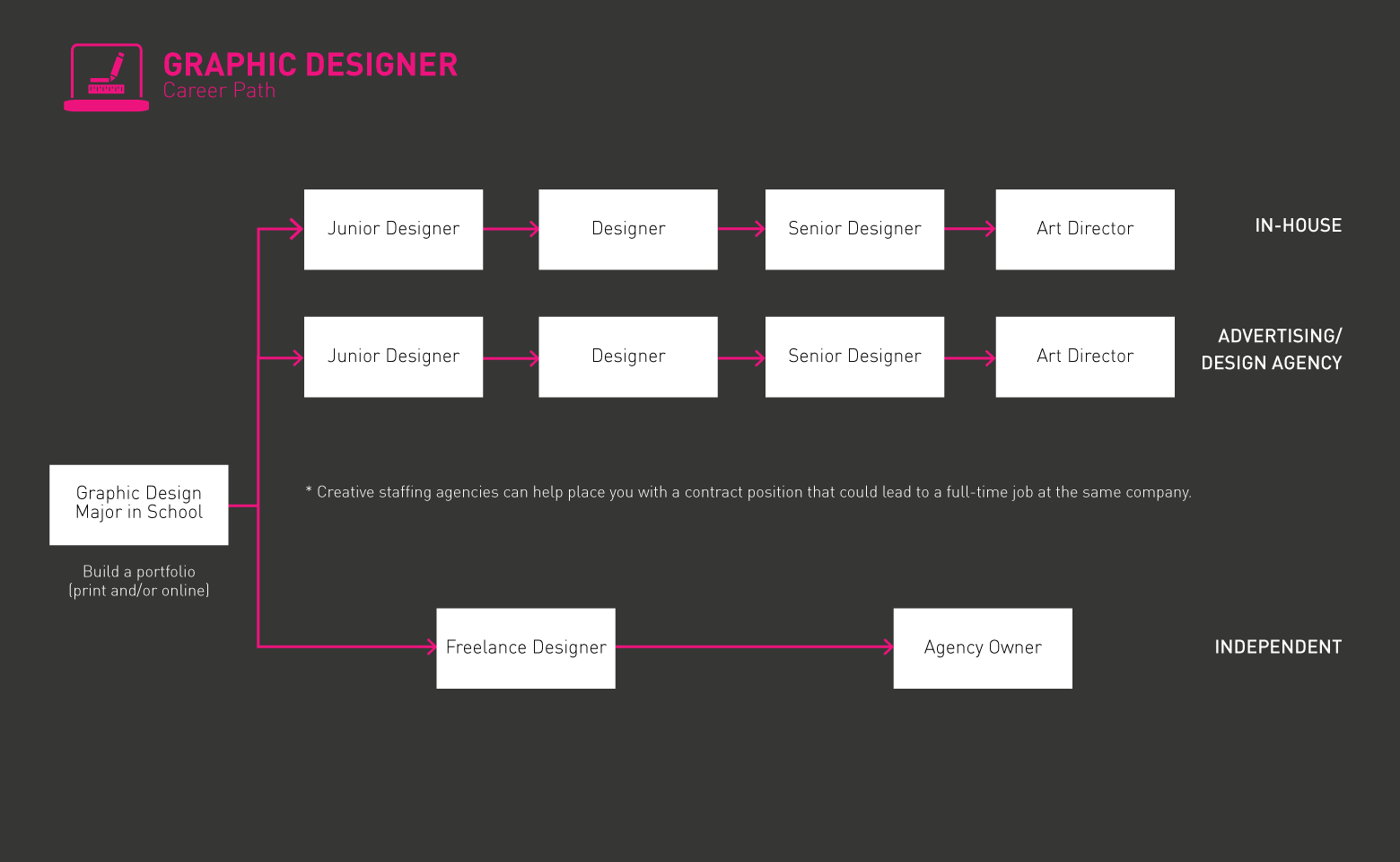Spotlights
Art Coordinator, Art Department Head, Art Supervisor, Artistic Director, Arts Administrator, Arts Manager, Creative Director, Creative Guru
Art directors oversee the creation of visual material for advertisements, print publications, product packaging, film productions and other outlets. They may look over specific elements, such as design concepts, original or stock artwork, layouts and the stylistic components of written materials. Art directors also oversee the work of staff members, such as writer, designers, or artists. They may also create budgets and deadlines, collaborate with other departments like copywriting or production and communicate with clients over the course of a project.
“Every day will be different. Some days will be meeting heavy, other days I will forget to stand up away from my computer. I concept advertising campaigns, create outdoor boards, design print ads, books, websites, web banners and everything else in between. “ Vikki McDonald, Freelance Graphic Designer and Art Director
- Gives artists creative freedom and ability to work with designs
- Provides independence to people who like to work on their own and make decisions
- Great for those who love working indoors
- High salary
“Seeing my work out in the open and knowing other people can see it. It's like your mum putting your drawing on the fridge but a thousand times better. “ Vikki McDonald, Freelance Graphic Designer and Art Director
- Determine how best to represent a concept visually
- Decide which photographs, art, or other design elements to use
- Develop the overall look or style of a publication, an advertising campaign, or a theater, television, or film set
- Manage graphic designers, set and exhibit designers, or other design staff
- Review and approve designs, artwork, photography, and graphics developed by other staff members
- Talk to clients to develop an artistic approach and style
- Coordinate activities with other artistic and creative departments
- Come up with detailed budgets and timelines
- Present designs to clients for approval
- Excellent aesthetic judgment
- Strong leadership skills to oversee the work of other artists
- Creativity and superb communication to develop products that meet clients' needs
- Ability to prioritize work and manage deadlines
- Self-employed
- Advertising company, marketing firm, or related service
- Newspaper, periodical, book, or directory publishers
- Motion picture / video operation
- Specialized design services
- Not many opportunities to solve problems mentally, which can be difficult for certain personality types
- Hard career to get into - a considerable amount of work related skill, knowledge, and experience is required, which will take up a large chunk of time and effort
- Long hours- expect to work more than 40 hours per week, especially during a project deadline
- Surreal scenes
- Travel photography
- Ultra-Violet over Millennial Pink
- Transparency in fashion
- Mixed metals within the home
- Continued speech recognition and progress on AI-based creative tools
- Arts and crafts
- Playing indoors
- Leading get togethers / playtime activities
- Standing out in art classes
- Employment of art directors is projected to grow in the next decade as they will continue to be needed to oversee the work of graphic designers, illustrators, photographers, and others engaged in artwork or layout design
- Employment of art directors is projected to decline in the publishing industry over the next decade as traditional print publications lose ground to other media forms; rather than focusing on the print layout of images and text, art directors for newspapers and magazines will increasingly design for web and mobile platforms
- Art Directors should have a bachelor’s degree in a suitable field such as art, design, or photography
- Most Art Directors have substantial related work experience and On-the-Job training prior to applying
- A Master of Fine Arts isn’t necessary, but can certainly boost your credentials. An MBA or Master’s in Arts Administration may also be helpful, as these can showcase your leadership and management credentials
- O*Net Online states that 74% of Art Directors have a bachelor’s and 17% have a master’s degree
- If you opt not to pursue either an MFA or MBA, some standalone management courses or a management certificate could be a useful substitute
- You might also sign up for an Arts Administration Internship, such as offered by Fredonia
- A portfolio—a collection of an artist’s work that demonstrates his or her styles and abilities—is essential; managers, clients, and others look at artists’ portfolios when they are deciding whether to hire an employee or contract for an art project
“Age of institution, quality of education, access to equipment.” Vikki McDonald, Freelance Graphic Designer and Art Director
Employers are looking for candidates that are proficient in:
- Adobe Systems Adobe Acrobat (document management software)
- Adobe Systems Adobe AfterEffects (Video creation and editing software)
- Adobe Systems Adobe Dreamweaver (Web page creation and editing software)
- Adobe Systems Adobe Director (Video creation and editing software)
- Adobe Systems Adobe Fireworks (Graphics or photo imaging software)
High School
- Sign up for art class to develop an eye for color and design
- Stock up on courses related to art, writing, business, marketing, public speaking, and leadership
- Test the waters and build skills in electives like website design, graphic arts, commercial art, and photography; if these are unavailable at your school, check out a local two-year college
- Develop strong writing and speaking skills in English and speech classes; communicating ideas clearly is a must
- Volunteer for activities and events that involve planning, organizing, leadership, and management
College
- Develop portfolio
- Join art and design related clubs
- Take courses in related fields to gain a broad spectrum of knowledge
- Take a public speaking course as well as writing courses
- Seek out leadership roles
- Build sense of confidence and independence by constantly stepping outside your comfort zone to gain more skills and experience
- Complete art and design related internship
- Find paid or volunteer opportunities with local arts and culture centers; get connected to the local arts scene and develop your reputation as someone who works hard, knows their business, and can be counted on to deliver!

- Not many Art Directors are self-employed! However, there are plenty of jobs available with PR firms, magazines, newspapers, design agencies, and film industry companies, too
- Complete all of your academic requirements and try to earn honors along the way
- List details of prior relevant work experience and extracurricular activities on your resume. Include statistics and dollar figures to prove how you added value
- Stay connected with your network of past professors and supervisors so they can put in a good word for you via a letter of reference or telephone call
- Scour the job portals such as Indeed.com and sign up for alerts so you don’t miss anything
- Check out the websites of specific organizations you want to work with; they might have openings that aren’t listed anywhere else
- Carefully scan job posts to ensure you meet all listed qualifications. Highlight keywords and phrases so you can add them to your resume, as applicable. It’ll help you get through any automated tracking software!
- Be prepared for interviews! Review sample Art Director interview questions, practice mock interviews, and make sure to dress the part of the director!
- Keep portfolio updated and include in application process
- Make connections at internships and within university program
- Gain experience as a graphic designer, fine artist, editor, or photographer, or in another art or design occupation for at least five years - maintain good references
- Stay up-to-date on industry trends and continue developing skills, especially within Adobe Acrobat programs
- Desire to brainstorm ideas
- Passion for pop culture, or at least desire to tune into it
- Team managing skills
- Ability to work under tight deadlines
- Patience to deal with difficult clients
Trang web
- Art Directors Guild
- AIGA
- Promax
- The One Club for Creativity
Sách vở
“Find the weakest element of your design, and make it the strongest.” Vikki McDonald, Freelance Graphic Designer and Art Director
Nguồn cấp tin tức

Công việc nổi bật

Các khóa học và công cụ trực tuyến







